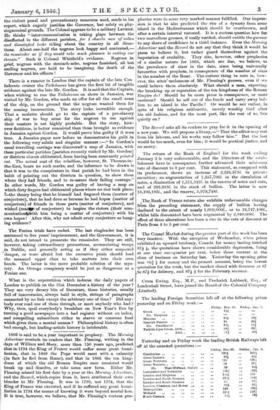1866 is said to be a year important in prophecy.
The Morning Advertiser remlnda its readers that Mr. Fleming, writing in the days of William and Mary, more than 150 years ago, predicted that in 1794 the King of France would suffer some great humi- liation, that in 1848 the Pope would meet with a calamity (in fact he fled from Rome), and that in 1866 the ten king- doms of which the old Roman Empire once consisted would break up and dissolve, or take some new form. Either Mr. Fleming missed his first date by a year or the Morning Advertiser, and the Record, which copies from it, have attributed their own blunder to Mr. Fleming. It was in 1793, not 1794, that the King of France was executed, and if he suffered any great humi- liation in 1794 the means of knowing it were beyond mortal ken. It is true, however, we believe, that Mr. Fleming's curious pro- phecies were in some very marked manner fulfilled. Our impres- sion is that he also predicted 'the rise of a dynasty from some island in the Mediterranean which should be overthrown, and after a certain interval restored. It is a curious question how far two marvellous guesses, if really verified, should entitle the guesser to. any. share of confidence in a third instance. Even the Morning Advertiser and the Record do not say that they think it would be pions to. believe it, but rather guard themselves against the imputation of credulity. They cite, however, other prophecies of a similar nature for 1866, which are due, we believe, to the prevalence of sixes in the date, sixes being universally favourites with prophets, in consequence of the number of sixes in the number of the Beast. The curious thing to note is, how- ever, the utterl,useleesness of Mr. Fleming's guesses, even if we could believe them absolutely. What should a man, expecting the breaking up or separation of the ten kingdoms of the Roman Empire do ? Should he be more pious in consequence, or more cautious? Should he sell out of the funds and carry away bul- lion to an island in the Pacific ? Or would he not rather, in spite of his religious arithmetic, merely worship God after his old fashion, and for the most part, like the rest of us, live quietly on ?




































 Previous page
Previous page